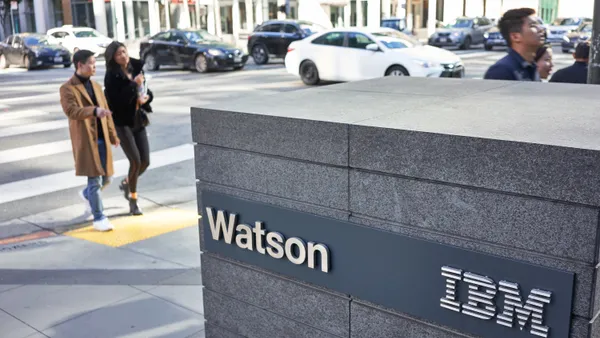In an AI industry marked by consolidation, a handful of companies are scooping up the lion's share of leading startups.
According to a report from analyst firm CB Insights, AI acquisitions rose six-fold from 2013 to 2018. Last year, acquisitions in that market hit a record 166 deals — a 38% year-over-year spike.
The firm's projections say 2019 is on track to sprint past last year, with over 140 acquisitions in the first eight months. Since 2010, there have been 635 AI acquisitions.
Driven by a desire to keep up with customer expectations and bringing on scarce talent, larger vendors are chomping at the bit to take over AI startups, a trend analysts and executives say is poised to continue.
Ongoing consolidation
When it comes to acquiring AI startups, Apple, Google, Microsoft and Amazon lead the pack.
In the case of the last three, the acquisitive trend is a response to a desire to expand the AI capabilities of their existing products, according to Jim Hare, research VP at Gartner.
"Cloud providers are competing to be the AI platform of choice," said Hare in an interview with CIO Dive. "They've been on an acquisition binge to get startups that have AI talent, and technology that's unique that they can assemble in a broad platform."
As they enter the market, the three hyperscale cloud providers are going after customers who don't want to manage several vendors for multiple use cases. A provider that can offer end-to-end solutions becomes more appealing.
As for what's driving Apple's appetite, think of new capabilities that have made their way to the company's consumer products. Siri, the virtual assistant that responds to voice commands from your iPhone, was the product of an acquisition, said Deepashri Varadharajan, lead AI analyst at CB Insights.
The trend of consolidation of AI is likely to continue as companies push to bring scarce talent into their ranks and boost existing capabilities. Decision makers say talent acquisition, especially in high-demand areas, constitutes a high priority.
AI acquisitions that have ties to the world of cybersecurity are also likely to continue. As attacks become more sophisticated, companies will turn to AI to integrate security services into their platforms, she said.
"That's top of mind for companies in different industries," said Varadharajan
Market of the future
With industry keeping a close eye on recessionary markers, there are also economic factors driving the trend of consolidation in the AI market.
"The reality is that AI is an expensive thing to develop, and to develop right," said Lane Lillquist, cofounder and CTO of InCloudCounsel, in an interview with CIO Dive. "This is something that requires capital and upfront investment."
This makes it more likely for AI technology to be developed inside the ranks of big players, since getting off the ground with an AI product is harder for smaller companies, said Lillquist.
The early wave of consolidation saw the tech giants building up teams of experts and adding to their portfolio. The trend to watch out for in the coming years will be a "second wave" of sorts, where AI acquisitions will focus on providing companies with industry-specific expertise.
"That next wave of consolidation will be where organizations focus on who has domain expertise," said Hare. "AI has got be contextualized to get the value out of it."
Companies that enter the market with the intention to verticalize have an additional competitive advantage, said Varadharajan. One example is Flatiron Health, a data analytics platform with AI capabilities for the healthcare space, which was acquired by Roche for $2 billion last year.
Consolidation in the market also means AI will increasingly become baked into all enterprise software processes, according to Hare.
"If you look at Salesforce, for example, they've tried to embed AI into sales and marketing," said Hare. "They're not the only ones: SAP and Oracle are doing it too."












